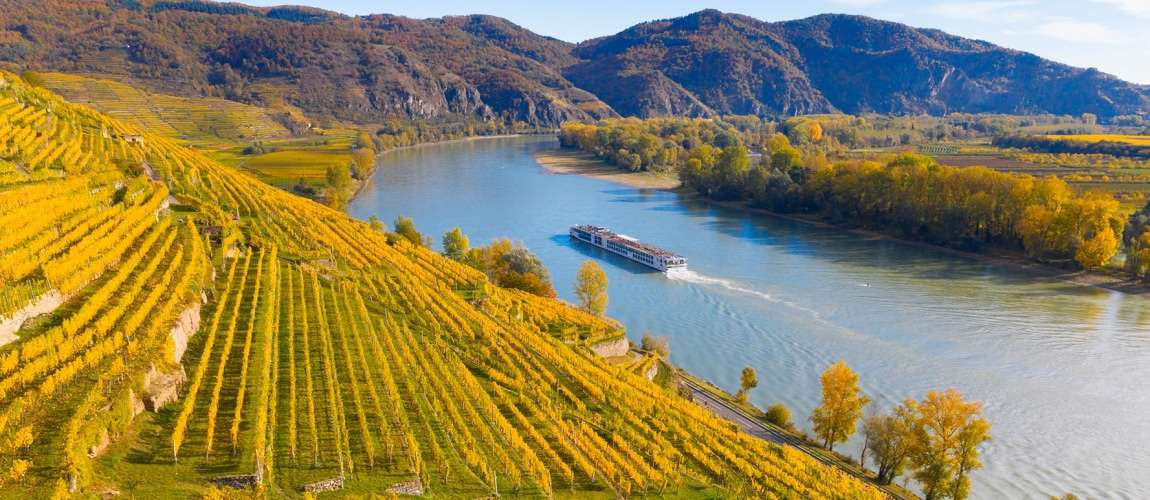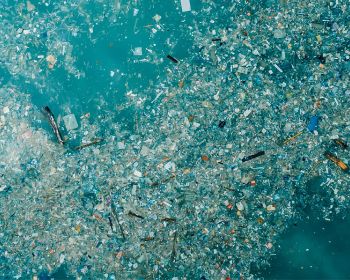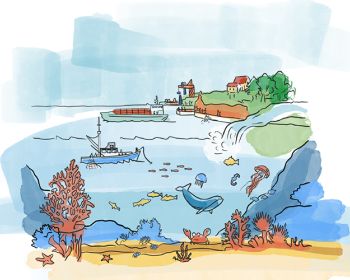Water, the first marker of climate change
Water is a vital resource that plays a crucial role in our health, our ecosystems and the economy at large. "Water has the particularity of circulating throughout the biosphere. Through its cycles, water links all natural environments – from glaciers to the Ocean – and, more intimately, all living organisms" explains Guillaume Poupy. Water is indispensable in our daily lives; we rely on it for safe drinking, agricultural irrigation, industrial processes, energy production, and more. However, water is a resource under pressure and the first marker of climate change. Droughts, storms, heavy rains, coastal erosion, floods…The United Nations (UN) estimates that nearly 90% of natural disasters caused or amplified by climate change are water-related. Furthermore, floods and droughts account for more than 20% of the economic losses caused by extreme weather events in the U.S. each year.
What are the biggest challenges to sustainable water management?
Water-related challenges are typically separated into three categories: two categories related to quantity, water excess and water shortage; and one related to quality, water pollution. "You may think that climate change is drying out land globally, but it's actually more complex than that. Climate change also causes an acceleration and intensification of the water cycle. With more water suspended in the atmosphere, there is more sudden and intense rainfall –thunderstorms, storms, heavy rains... And intense rainfall can subsequently cause flooding, spread pollution, and disrupt proper groundwater recharge” notes Guillaume Poupy. Water is thus becoming increasingly scarce, unpredictable and polluted, ultimately posing a direct threat to many economic activities, natural environments rich in biodiversity, and people around the world who depend on access to clean water.
"Climate change also causes an acceleration and intensification of the water cycle. With more water suspended in the atmosphere, there is more sudden and intense rainfall –thunderstorms, storms... And intense rainfall can subsequently cause flooding, spread pollution, and disrupt proper groundwater recharge."
Droughts and floods: two sides of the water crisis
In a NASA study published in 2023, two scientists examined 20 years’ worth of data (2002 to 2021) from the NASA/German GRACE and GRACE-FO satellites to identify extreme drought and flood events and their frequency over time. The results, from the "Changing Intensity of Hydroclimatic Extreme Events Revealed by GRACE and GRACE-FO" study modelled in this video, confirm that these climatic episodes are increasing in occurrence over time.
In 2024, storms and floods affected approximately 413,000 people in Europe, particularly in southeastern Spain and the province of Valencia where intense and prolonged rainfall and river flooding led to 232 deaths. According to a report by the European Climate Change Service Copernicus and the World Meteorological Organization (WMO), the material damage related to floods in Europe in 2024 is estimated at more than 18 billion euros.
Two-thirds of the fresh water on Earth exists in the form of ice. The WMO estimates that in 2023, glaciers lost more than 600 gigatonnes of water, the largest mass loss recorded in the last five decades. Though accelerated glacier melting is currently supporting the flow of rivers, it is getting us accustomed to an abundance of water that is only temporary.
estimated material damage related to floods in Europe in 2024
Access to clean and unpolluted water
So, what exactly is water pollution? Water pollution is the direct or indirect discharge of materials or molecules with negative effects on the environment (i.e., pesticides or excess agricultural inputs that end up in watercourses and aquifers through runoff) into aquatic environments such as rivers, lakes, and wetlands.
These pollutants can vary widely in nature: non-biodegradable materials like plastic waste; excess biological materials; toxic chemical molecules (especially PFAS or “forever chemicals”); pharmaceutical residues, etc. It is important to tackle this issue of water quality as it is vital for the health of ecosystems and individuals. According to the latest UN report (2025) on the achievement of the sixth Sustainable Development Goal, dedicated to the sustainable management of water resources, 2.2 billion people did not have access to safely managed drinking water in 2024. “Preventing and addressing pollution takes different forms depending on the type of pollutant. The best solution is to first act at the source by reducing the quantities of pollutants produced, then at the time of emission by capturing the pollutants before they reach the natural environment, and finally downstream by removing them from the polluted environment when possible” notes Guillaume Poupy.
Key figures on water across the globe in 2024
people lacked safely managed drinking water
of domestic wastewater was safely treated
people lacked access to basic hygiene services at home, including 646 million children
According to the UN report on Sustainable Development Goals (2025).
Water, a resource under pressure in Europe
In Europe, climatic variations cause considerable differences in the distribution of renewable freshwater, ranging from 120 m3 per person per year in Malta, to 70,000 m3 per person per year in Norway according to the Water Information System for Europe (WISE). Climate change is exacerbating these disparities, reducing resources in already arid areas. Every year, around 34% of the EU's population is affected by shortages, which are particularly felt in summer.
In France, freshwater resources – which are 94% dependent on rainfall – are decreasing: between 1990-2001 and 2002-2022, freshwater resources declined by 14%, particularly in the south of France, under the combined effect of rising temperatures, reduced rainfall and intensifying droughts. When water is scarce, economic sectors such as the agricultural sector face yield losses caused by water use restrictions related to water stress. Thermal and hydroelectric power plants are not able to produce as much electricity, which in turn increases energy prices (European Environment Agency, 2021). This is why the European Commission has set a target to improve water use efficiency by at least 10% by 2030 and encourages Member States to set their own targets based on their national circumstances.
of freshwater resources declined between 1990-2001 and 2002-2022, particularly in the south of France
How can financial institutions like BNP Paribas support clients with sustainable water management?
The OECD estimates that the cost of ensuring access to water globally exceeds 1 trillion dollars per year, which represents 1.21% of global GDP. This requires specific financing and solutions that are adapted to the various water challenges. As such, the banking sector is a central player in financing the water transition and climate change adaptation. "As a bank committed to sustainable finance and the protection of natural resources, BNP Paribas plays a key role in meeting investment needs and assisting its clients in finding the right long-term financing solutions. For example, this includes reducing the impact of clients’ industrial wastewater, supporting innovative solutions, and financing water infrastructure projects" explains Nathalie Jaubert.
"Lack of water, excess water, or overly polluted water can cause business interruptions affecting our clients’ revenues, or cause the destruction of property. It is important for our clients to anticipate and properly protect themselves against water-related risks."
Water is essential to the functioning of all human activity, and thus, the economy. Irrigation, raw materials, cooling or processing fluids, transportation routes... water is everywhere. Thus, water risk management is also crucial for clients. “Lack of water, excess water, or overly polluted water can cause business interruptions affecting our clients’ revenues, or cause the destruction of property. It is important for our clients to anticipate and properly protect themselves against water-related risks” says Nathalie Jaubert. However, this also represents new investment opportunities in "water tech" such as pollution filtering solutions or rainwater harvesting. As Nathalie Jaubert explains: "The subject of water also represents opportunities for certain sectors of activity: new installations and new solutions must be developed to enable business continuity in a changing context".
Not only is water a scarce resource, but it is also at the heart of ecological and social transitions. We are committed to financing clients and partners whose solutions enable equitable and sustainable access to water.
Faced with water stress, what solutions can be found to anticipate, innovate and invest?
Explore some solutions supported by BNP Paribas
- Launched in 2008, the AQUA investment fund allows individual clients to invest in companies and projects that contribute to the preservation and sustainable management of water, such as water infrastructure, water treatment and utilities. The AQUA strategy is one of the market leaders with more than €6.2 billion in assets under management and has recorded an average annual performance of nearly 20% over the last 3 years*.
- The Group also structures innovative financing for water and territorial projects around the world. This includes the issuance of a £650 million green bond for the modernisation and extension of water treatment plants in the United Kingdom in 2024 and a 260 million Swiss Franc green bond for the construction of hydroelectric dams in Korea in 2025.
- BNP Paribas finances start-ups such as Blue Foot Membranes, which develops innovative filtration membranes for wastewater treatment, allowing them to be reused to ultimately reduce water pollution.
- Thanks to its start-up accelerator WAI by BNP Paribas (We Are Innovation), the Group supports Kumulus, a solution that converts moisture in the air into drinking water. Kumulus offers a useful sustainable technology, designed to water access in areas most vulnerable to water shortages. Discover this innovative solution.
* Source: BNP Paribas Asset Management as of 10 September 2025, retail share class of BNP Paribas Funds' AQUA fund, net of fees.
Past performance is not a guarantee of future performance.









